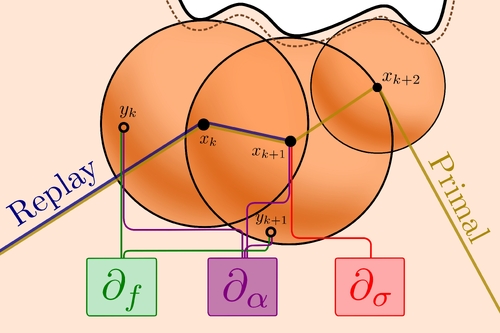Solving Inverse PDE Problems using Grid-Free Monte Carlo Estimators

DescriptionPartial differential equations can model diverse physical phenomena including heat diffusion, incompressible flows, and electrostatic potentials. Given a description of an object's boundary and interior, traditional methods solve such PDEs by densely meshing the interior and then solving a large and sparse linear system derived from this mesh. Recent grid-free solvers take an alternative approach and avoid this complexity in exchange for randomness: they compute stochastic solution estimates and generally bear a striking resemblance to physically-based rendering algorithms.
In this article, we develop algorithms targeting the inverse form of this problem: given an already existing solution of a PDE, we infer parameters characterizing the boundary and interior. In the grid-free setting, there are again significant connections to rendering, and we show how insights from both fields can be combined to compute unbiased derivative estimates that enable gradient-based optimization. In this process, we encounter new challenges that must be addressed to obtain practical solutions. We introduce acceleration and variance reduction strategies and show how to differentiate branching random walks in reverse mode.
We finally demonstrate our approach on both simulated data and a real-world electrical impedance tomography experiment, where we reconstruct the position of a conducting object from voltage measurements taken in a saline-filled tank.
In this article, we develop algorithms targeting the inverse form of this problem: given an already existing solution of a PDE, we infer parameters characterizing the boundary and interior. In the grid-free setting, there are again significant connections to rendering, and we show how insights from both fields can be combined to compute unbiased derivative estimates that enable gradient-based optimization. In this process, we encounter new challenges that must be addressed to obtain practical solutions. We introduce acceleration and variance reduction strategies and show how to differentiate branching random walks in reverse mode.
We finally demonstrate our approach on both simulated data and a real-world electrical impedance tomography experiment, where we reconstruct the position of a conducting object from voltage measurements taken in a saline-filled tank.
Event Type
Technical Papers
TimeTuesday, 3 December 20249:00am - 12:00pm JST
LocationHall C, C Block, Level 4








